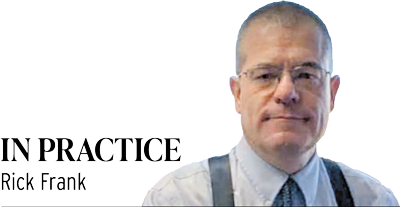Subscriber Benefit
As a subscriber you can listen to articles at work, in the car, or while you work out. Subscribe Now We’ve all had those moments where we’ve thought to ourselves, “Geez, I wish I had known that before.” Life as a lawyer is often a trial by fire, and much of what you need to know in the real world isn’t taught in law school. In that thinking — with the help of my fellow resource prosecutor colleagues — we came up with our “Top 5 Tips for New Attorneys.” Even for a veteran counselor, some of these might be helpful.
We’ve all had those moments where we’ve thought to ourselves, “Geez, I wish I had known that before.” Life as a lawyer is often a trial by fire, and much of what you need to know in the real world isn’t taught in law school. In that thinking — with the help of my fellow resource prosecutor colleagues — we came up with our “Top 5 Tips for New Attorneys.” Even for a veteran counselor, some of these might be helpful.
Reputation and character
Your reputation is everything and starts on Day One. The legal community is smaller than you think, and today’s opponents will be tomorrow’s judges or bosses or board members. Above all, be respectful and ethical. Don’t write anything in an email or message that you do not want the world to read and attribute to you. Take a minute (and let a trusted colleague review) before hitting “send” when you’re heated. Your character comes from what you do when no one is watching and is just as important. No case is worth risking your law license or integrity by cutting corners or skating ethics. Yes, as an attorney, you are participating in an adversarial system, and your passion is part of what makes you successful. But just remember that you can’t go back and change how people view you, so make sure your actions reflect the person you want to be.
It’s OK to ask questions
Ask questions to learn what you need to know. Don’t pretend you know something you don’t — because it will eventually land you (and your client) in hot water. Remain humble and open to suggestions, corrections and advice. You can do all this while still being confident; it will make you a more competent and well-respected attorney. You are smart — getting through law school and passing the bar is not easy — but I promise you don’t know everything … yet. Many of the attorneys who have walked this path before you have wisdom to share with new lawyers: Ask them, listen to them, watch them.
Enormous responsibility
Never forget the power you wield and how what you do can dramatically impact a person’s life. It can be easy to fall into the “job” mindset of handling case after case, file after file, name after name. To a lawyer, each of those files is just another task to get done so you can go home at the end of the day. But to the people in that file, they can be life-changing matters. A prosecutor handling a misdemeanor case may think of it as trivial in their stack of felony cases, but to the person charged, it can impact not only their liberty, but also their employment, ability to drive and financial security. A civil attorney handling one of many estate cases can easily lose sight of the fact that the properties in question may have been in a family for generations. The list of examples goes on and on, but the point is, what we do matters. When we serve as an attorney, we take on a great responsibility, and it’s important we never lose sight of that.
You can’t win ‘em all
If you are a litigator, don’t take losses personally. While you’re at it, don’t get too big of an ego when you win. No one bats a thousand, and the justice system is bigger than any one person, even the chief justice of the United States. Very few things are black and white. Your opponents are not evil, likely have an arguable position and are not completely wrong. If you lose a trial, a dispositive motion or an appeal, learn what you can from it to apply in the future. But then move on and don’t obsess over it. Don’t lambast the jury or judge(s) or opposing counsel, and certainly not in any public or permanent format. Pick up the next file and move along. If you’ve done everything you could ethically do to assist your client, sometimes it is just not meant to be.
Don’t reinvent the wheel!
One of the most valuable pieces of advice a veteran prosecutor gave me: There is a template for almost anything! Motions, briefs and proposed orders that you file have likely been filed before somewhere. Ask around to colleagues, officemates, law school friends, etc., before you start from the beginning on anything. Someone likely has a template or an example of something like what you’re doing. The same with research — very few arguments are a case of first impression. I’m certainly not saying to plagiarize anything or just copy and paste, but a good template or similar brief gives you a great starting point for your work and can save you a ton of time.
While there will be some challenging days, it’s an incredible profession to be in. If you’re just starting, best wishes to you for a long, rewarding and honorable career as a minister of justice!•
__________
Rick Frank is the drug resource prosecutor for IPAC. Amy Blackett, Jim Oliver, Chris Daniels and Glenn Johnson contributed to this article. Opinions expressed are those of the authors.
Please enable JavaScript to view this content.
